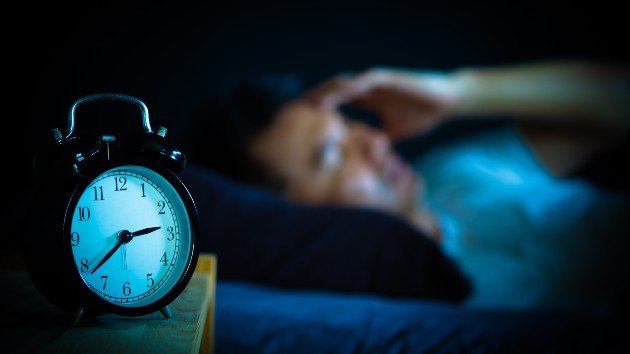By DR. NICHOLAS NISSEN, ABC News
(NEW YORK) — Many people’s mental health has been hit hard by COVID-19, with rates of depression, anxiety and post-traumatic stress disorder (PTSD) on the rise. Now, researchers from the University of Ottawa in Canada have found that for many, the pandemic is also taking a toll on a good night’s sleep.An analysis of nearly 190,000 participants looked at the mental health of those affected by COVID-19 — survivors, family members and health care workers — and compared it against the general population under normal circumstances. What researchers found was disheartening. Depression, anxiety and PTSD rates are significantly worse than before the pandemic. But, worst of all is the climbing rate of insomnia.Almost a quarter (23.87%) of those affected by COVID-19 have insomnia. Among all those affected by COVID-19, health care workers have the highest rate of insomnia, with more than one in three (36.53%) reporting difficulty sleeping.Insomnia is a common sleep disorder, and millions of Americans seek medical advice every year for their difficulties falling asleep, staying asleep or waking up at the right time.Sleeping difficulties can have an enormous impact on our quality of life, but experts say there are concrete steps you can take to try to improve sleep quality.If you are suffering from insomnia, you are not alone. Here are five tips to sleep better, rest better and feel better:See your doctorSleep problems have many different causes, and you’ll need a knowledgeable professional to help assess and diagnose your specific sleep problem. Some people may have difficulty falling asleep (which could have psychological or behavioral causes) while others may have difficulty staying asleep (which could be from a sleep environment with too many interruptions). Medical problems like sleep apnea or the medications you take might be contributing as well. For this reason, only an experienced professional can help you get to the root of the problem.Start the day off rightThe quality of our day determines the quality of our night. Waking up at the same time every day is an important way to help our body create a reliable rhythm. Like plants and animals, our bodies rise and rest according to a rhythmic day-night cycle. Waking up early on weekdays and sleeping in on the weekends throws off this rhythm, putting ourselves in a state of perpetual jet lag. Choose a consistent time to wake up that works for every day of the week, and avoid naps if you have nighttime sleep issues.
Energize early, not lateTry to get 30 to 40 minutes of bright light exposure first thing in the morning to show your body’s internal clock that the day has begun. If you enjoy caffeine, have it in the morning, not the afternoon; about 50% of the caffeine from a dinnertime coffee will be in your bloodstream when you go to bed, and it will directly inhibit one of your body’s sleep compounds, called adenosine. Finally, daily exercise is a great way to ensure we feel sleepy at bedtime, but it can be counterproductive if done too late. Avoid exercising within a few hours before lights out.Prepare for bedWe’re not talking about pajamas and brushing teeth; we’re talking about winding down as soon as the sun starts to set. Bright lights signal “daytime” to our brains, and in our modern age, looking into bright screens until we shut our eyes leaves our bodies confused. Try to limit screen time within an hour of bedtime, wear blue-light-blocking glasses and consider adding an app like F.lux, which filters out the bright blue light that gets in the way of our sleep, to your devices. Turn down the lights with sunset, and use candles or dim lamps. Limit alcohol and avoid eating within three hours of going to sleep. Finally, use your last hour to meditate, pray or read books.Create a sleep sanctuaryFor best sleep, the bedroom is for two things only: sleep and intimacy. Remove TVs and computers, and avoid working in bed. Create a cool, pitch-black environment, and create an atmosphere that is free from interruptions. This means silencing your phone (or keeping it out of the bedroom altogether), trying to coordinate sleep schedules with your sleep partner and making sure the environment is as soundproofed as possible.Copyright © 2020, ABC Audio. All rights reserved.












